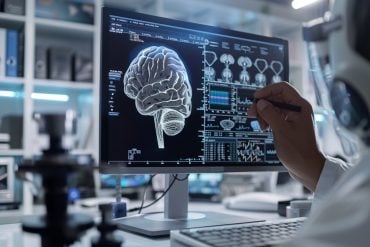Summary: Specific transfer RNAs (tRNAs) are associated with epilepsy. The levels of tRNA fragments in blood samples are higher pre-seizure. The findings provide a novel biomarker for the detection of seizures prior to their occurrence.
Source: RCSI
A new study has found a pattern of molecules that appear in the blood before a seizure happens. This discovery may lead to the development of an early warning system, which would enable people with epilepsy to know when they are at risk of having a seizure.
Researchers at FutureNeuro, the SFI Research Centre for Chronic and Rare Neurological Diseases, hosted at RCSI (Royal College of Surgeons in Ireland) led the study, which is published in the current edition of the Journal of Clinical Investigation (JCI).
FutureNeuro and RCSI researchers have discovered molecules in the blood that are higher in people with epilepsy before a seizure happens. These molecules are fragments of transfer RNAs (tRNAs), a chemical closely related to DNA that performs an important role in building proteins within the cell. When cells are stressed, tRNAs are cut into fragments. Higher levels of the fragments in the blood could reflect that brain cells are under stress in the build up to a seizure event.
Using blood samples from people with epilepsy at the Epilepsy Monitoring Unit in Beaumont Hospital, Dublin and in a similar specialist centre in Marburg, Germany, the group found that fragment levels of three tRNAs “spike” in the blood many hours before a seizure.

“People with epilepsy often report that one of the most difficult aspects of living with the disease is never knowing when a seizure will occur,” said Dr Marion Hogg, FutureNeuro investigator, Honorary Lecturer at RCSI, and the study’s lead author.
“The results of this study are very promising. We hope that our tRNA research will be a key first step toward developing an early warning system.”
Approximately 40,000 people in Ireland have epilepsy and one third of those do not respond to current treatments, meaning they continue to experience seizures. The World Health Organisation estimates that more than 50 million people worldwide have epilepsy.
Credit: RCSI.
“New technologies to remove the unpredictability of uncontrolled seizures for people with epilepsy are a very real possibility,” said Professor David Henshall, Director of FutureNeuro and Professor of Molecular Physiology and Neuroscience at RCSI who was a co-author on the paper.
“Building on this research we in FutureNeuro hope to develop a test prototype, similar to a blood sugar monitor that can potentially predict when a seizure might occur.”
Funding: Funders of the research included Science Foundation Ireland (SFI), the European Regional Development Fund, FutureNeuro industry partners and the European Union’s ‘Seventh Framework’ Programme FP7 (EpimiRNA).
Source:
RCSI
Media Contacts:
Journal of Clinical Investigation – RCSI
Image Source:
The image is credited to Maxwell Photography.
Original Research: Closed access
“Elevation in plasma tRNA fragments precede seizures in human epilepsy”. Marion C. Hogg, Rana Raoof, Hany El Naggar, Naser Monsefi, Norman Delanty, Donncha F. O’Brien, Sebastian Bauer, Felix Rosenow, David C. Henshall, and Jochen H.M. Prehn.
Journal of Clinical Investigation. doi:10.1172/JCI126346
Abstract
Elevation in plasma tRNA fragments precede seizures in human epilepsy
Transfer RNAs (tRNAs) are a major class of noncoding RNA. Stress-induced cleavage of tRNA is highly conserved and results in tRNA fragments. Here we find specific tRNA fragments in plasma are associated with epilepsy. Small RNA sequencing of plasma samples collected during video-EEG monitoring of focal epilepsy patients identified significant differences in three tRNA fragments (5′GlyGCC, 5′AlaTGC, and 5′GluCTC) from controls. Levels of these tRNA fragments were higher in pre-seizure than post-seizure samples, suggesting they may serve as biomarkers of seizure risk in epilepsy patients. In vitro studies confirmed that production and extracellular release of tRNA fragments was lower after epileptiform-like activity in hippocampal neurons. We designed PCR-based assays to quantify tRNA fragments in a cohort of pre- and post-seizure plasma samples from focal epilepsy patients and healthy controls. Receiver operating characteristic analysis indicated that tRNA fragments potently distinguished pre- from post-seizure patients. Elevated tRNA fragments levels were not detected in patients with psychogenic non-epileptic seizures, and did not result from medication tapering. This study identifies a novel class of epilepsy biomarker and reveals the potential existence of prodromal molecular patterns in blood that could be used to predict seizure risk.






